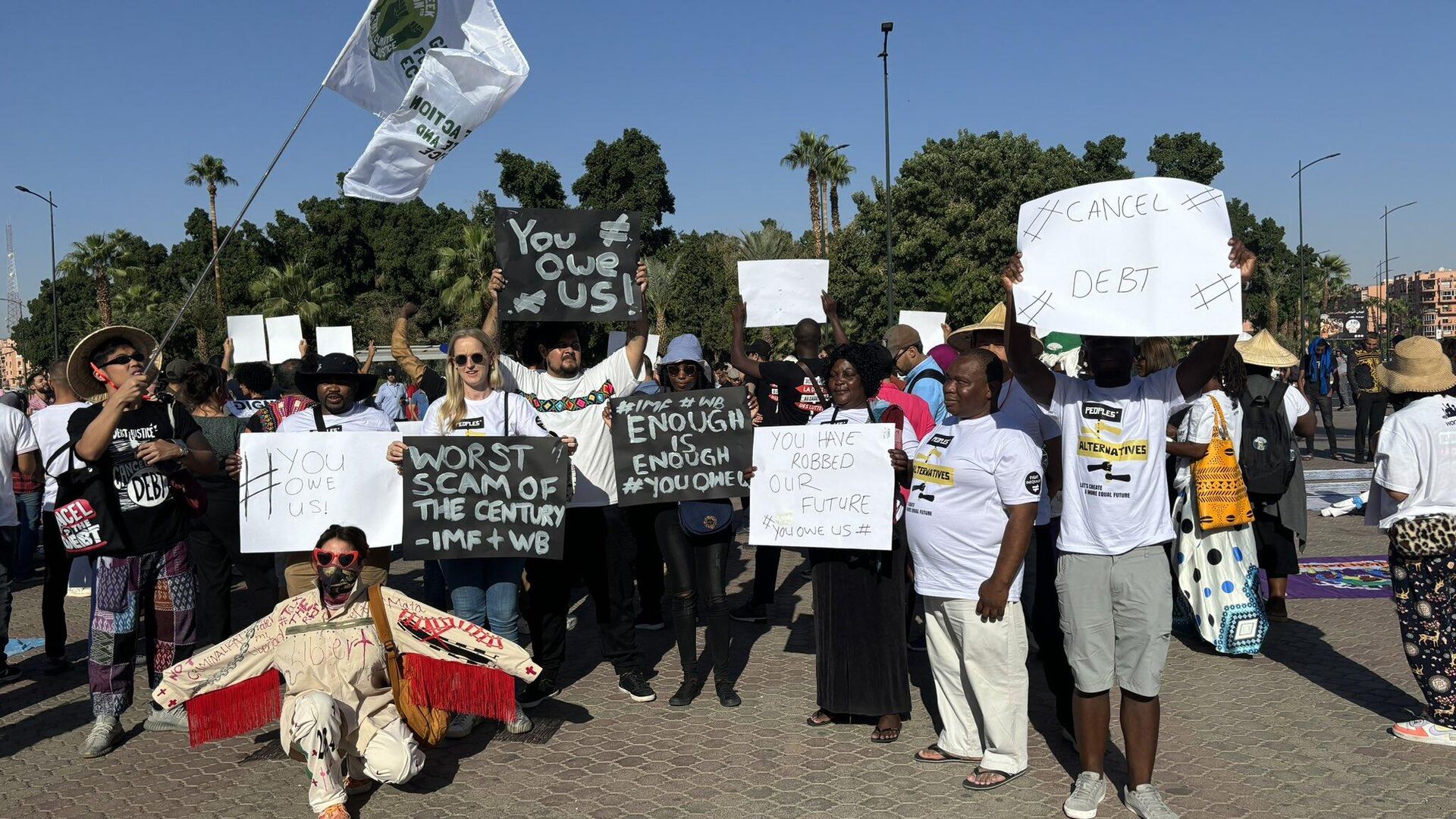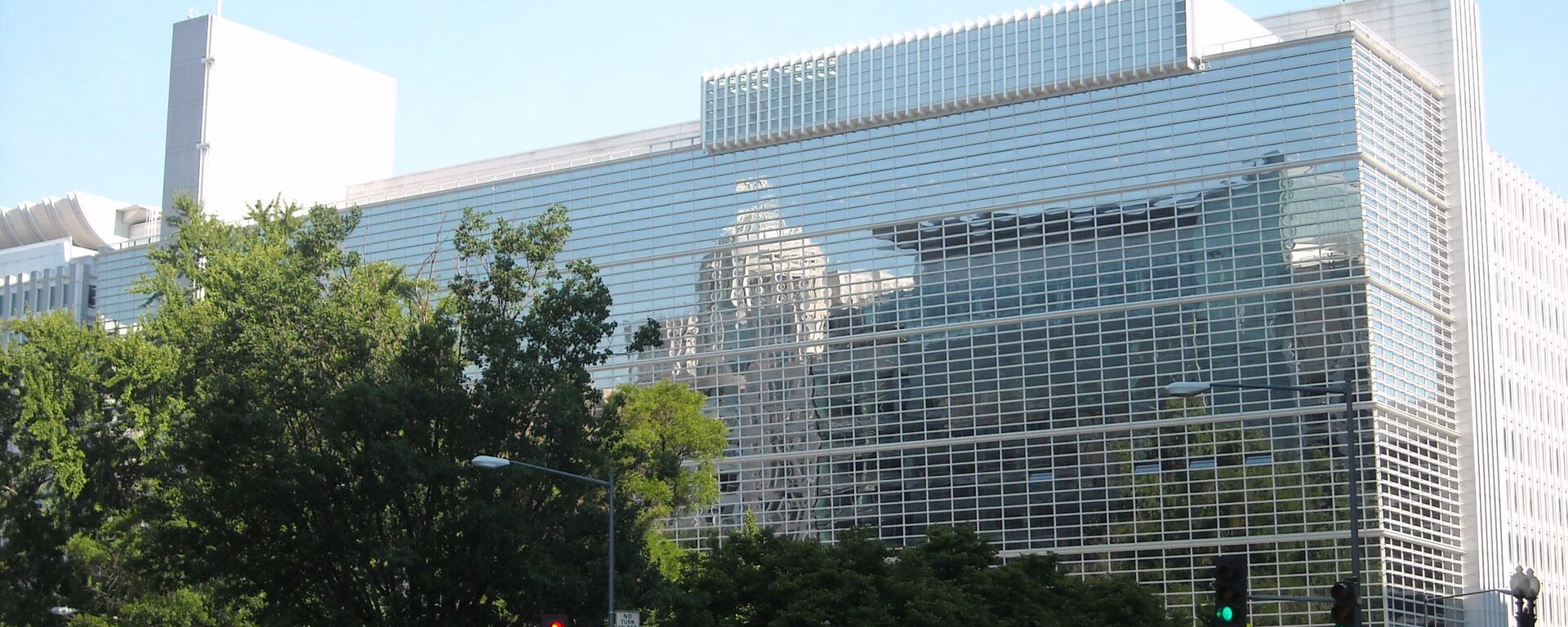https://en.sputniknews.africa/20231013/biggest-scam-of-the-century-global-south-activists-slam-world-bank--imf-1062752781.html
'Biggest Scam of the Century': Global South Activists Slam World Bank, IMF
'Biggest Scam of the Century': Global South Activists Slam World Bank, IMF
Sputnik Africa
The Fight Inequality Alliance, an organization aiming to consolidate global efforts to build a fairer and more equitable economic system, held its annual... 13.10.2023, Sputnik Africa
2023-10-13T13:28+0200
2023-10-13T13:28+0200
2023-10-13T15:01+0200
international monetary fund (imf)
international
sub-saharan africa
zimbabwe
southern africa
zambia
world bank
economy
cote d'ivoire (ivory coast)
west africa
https://cdn1.img.sputniknews.africa/img/07e7/0a/0d/1062758345_0:192:2048:1344_1920x0_80_0_0_e7636050ea87aa18f2da44d88af3d9aa.jpg
The International Monetary Fund (IMF) and the World Bank were designed to protect the interests of rich countries and enrich the wealthiest at the expense of the rest of the world, the jury of the People's Alternative Global Tribunal said in its verdict.The Tribunal brought together activists from developing countries including India, Zambia and Zimbabwe to testify on the effects the IMF's and World Bank's inequality and influence have had on their specific countries.Masimba Kuchera, chairman of Zimbabwe's Disability Reform Coalition, pointed out in his speech that in the early Nineties, in return for a loan, the World Bank ordered Zimbabwe to reduce the state's role in social services, with the result that "those with money could take control of social services and make a profit out of them".As a result, he noted, people with disabilities have suffered as facilities have been withdrawn and their access to equipment and education to help them lead a full life has been curtailed. Furthermore, Kuchera said that Zimbabwe has a $7 billion debt to the IMF and World Bank, which the government has promised to repay to the organization by 2025 and the repayment will further reduce the state's involvement in the social sector.Another speaker, Zambian farmer Clare Chobela Mukupa, said the conditions the IMF has imposed on aid to Zambia have resulted in "enslaving people in the rural areas". She argued that the IMF brought "misery" as the organization ordered Zambia to cut fuel prices, which led to higher food, fertilizer and chemical prices.After the farmer's presentation, the moderator asked attendees of the event to show a red card to the IMF as a sign of agreement that the organization "destroyed the Zambian economy", which all attendees and speakers did.Speakers from Malawi, Kenya, Cote d'Ivoire, and Egypt also shared their views on the harms associated with World Bank and IMF aid conditions. Jessica Mandanda, gender and communications specialist from Malawi said that her state had adopted 10 structural adjustment programs recommended by the IMF and the World Bank, in particular a cut in public funding for the social sector, especially health. As a result, she added, hospitals have not been able to buy the equipment they need, nor have they been able to build new buildings to provide emergency care. She told the story of a local woman who came to the hospital to give birth and started bleeding but the doctors were unable to give her emergency treatment because of a power cut at the hospital and she died.Daisy Abwao, member of the Fight Inequality Alliance in Kenya, revealed that the decision by the East African government to prioritize its debt repayment to the IMF and the World Bank has resulted in limited access to healthcare and education for poor people. Her views were echoed by activists from Egypt and Cote d'Ivoire who linked the terms of the Bretton Woods institutions to social problems in their countries.Discussions on debt cancellation for poor nations, especially against the backdrop of COVID pandemic effects, are also being raised within the nations. On Tuesday, Cote d'Ivoire Finance Minister Adama Coulibaly called for cancelling the debt of the poorest and most vulnerable nations.
https://en.sputniknews.africa/20231005/sub-saharan-africa-economic-growth-forecast-to-decrease-11-in-2023-world-bank-says-1062554821.html
zimbabwe
southern africa
zambia
cote d'ivoire (ivory coast)
west africa
kenya
Sputnik Africa
feedback@sputniknews.com
+74956456601
MIA „Rossiya Segodnya“
2023
Maxim Grishenkin
https://cdn1.img.sputniknews.africa/img/07e7/0a/17/1063018107_0:0:1104:1103_100x100_80_0_0_03090c85a11f5d2e8a19cf1d989443c9.jpg
Maxim Grishenkin
https://cdn1.img.sputniknews.africa/img/07e7/0a/17/1063018107_0:0:1104:1103_100x100_80_0_0_03090c85a11f5d2e8a19cf1d989443c9.jpg
News
en_EN
Sputnik Africa
feedback@sputniknews.com
+74956456601
MIA „Rossiya Segodnya“
Sputnik Africa
feedback@sputniknews.com
+74956456601
MIA „Rossiya Segodnya“
Maxim Grishenkin
https://cdn1.img.sputniknews.africa/img/07e7/0a/17/1063018107_0:0:1104:1103_100x100_80_0_0_03090c85a11f5d2e8a19cf1d989443c9.jpg
international monetary fund (imf), international, zimbabwe, southern africa, zambia, world bank, economy, cote d'ivoire (ivory coast), west africa, kenya
international monetary fund (imf), international, zimbabwe, southern africa, zambia, world bank, economy, cote d'ivoire (ivory coast), west africa, kenya
'Biggest Scam of the Century': Global South Activists Slam World Bank, IMF
13:28 13.10.2023 (Updated: 15:01 13.10.2023) The Fight Inequality Alliance, an organization aiming to consolidate global efforts to build a fairer and more equitable economic system, held its annual People's Alternative Global Tribunal in Marrakech, Morocco, to consider what effects the policies of the World Bank and IMF have on developing countries.
The International Monetary Fund (IMF) and the World Bank were designed to protect the interests of rich countries and enrich the wealthiest at the expense of the rest of the world, the jury of the People's Alternative Global Tribunal said in its verdict.
"The World Bank and the International Monetary Fund are the biggest scam of the century. They are robbing the poor and funding the rich," Bhumika Muchhala, a researcher and analyst, told the Tribunal.
The Tribunal brought together activists from developing countries including India, Zambia and Zimbabwe to testify on the effects the IMF's and World Bank's inequality and influence have had on their specific countries.
Masimba Kuchera, chairman of Zimbabwe's Disability Reform Coalition, pointed out in his speech that in the early Nineties, in return for a loan, the World Bank ordered Zimbabwe to reduce the state's role in social services, with the result that "those with money could take control of social services and make a profit out of them".
As a result, he noted, people with disabilities have suffered as facilities have been withdrawn and their access to equipment and education to help them lead a full life has been curtailed.
Furthermore, Kuchera said that
Zimbabwe has a $7 billion debt to the IMF and World Bank, which the government has promised to repay to the organization by 2025 and the repayment will further reduce the state's involvement in the social sector.
"We want the IMF and World Bank to acknowledge that they have messed up so that they cancel the debt," he concluded.
Another speaker, Zambian farmer
Clare Chobela Mukupa, said the conditions the IMF has imposed on aid to Zambia have resulted in "enslaving people in the rural areas". She argued that the IMF brought "misery" as the organization ordered
Zambia to cut fuel prices, which led to higher food, fertilizer and chemical prices.
"The IMF dictates what countries should do, how they should carry out their activities, what policies should be taboo, and this has really brought us misery," the activist remarked.
After the farmer's presentation, the moderator asked attendees of the event to show a red card to the IMF as a sign of agreement that the organization "destroyed the Zambian economy", which all attendees and speakers did.
Speakers from Malawi, Kenya, Cote d'Ivoire, and Egypt also shared their views on the harms associated with World Bank and IMF aid conditions.
Jessica Mandanda, gender and communications specialist from Malawi said that her state had adopted 10 structural adjustment programs recommended by the IMF and the World Bank, in particular a cut in public funding for the social sector, especially health. As a result, she added, hospitals have not been able to buy the equipment they need, nor have they been able to build new buildings to provide emergency care.
She told the story of a local woman who came to the hospital to give birth and started bleeding but the doctors were unable to give her emergency treatment because of a power cut at the hospital and she died.
Daisy Abwao, member of the Fight Inequality Alliance in Kenya, revealed that the decision by the East African government to prioritize its debt repayment to the IMF and the World Bank has resulted in limited access to healthcare and education for poor people. Her views were echoed by activists from Egypt and Cote d'Ivoire who linked the terms of the Bretton Woods institutions to social problems in their countries.
Discussions on debt cancellation for poor nations, especially against the backdrop of COVID pandemic effects, are also being raised within the nations. On Tuesday,
Cote d'Ivoire Finance Minister Adama Coulibaly called for cancelling the debt of the poorest and most vulnerable nations.



